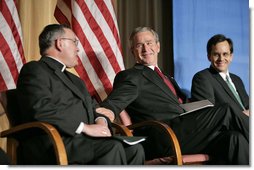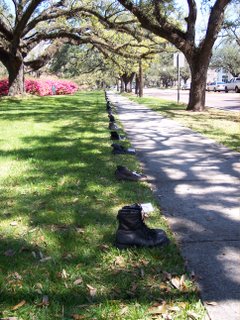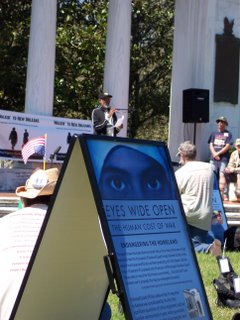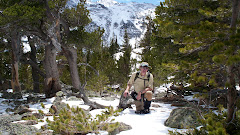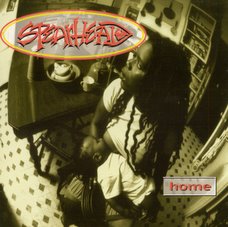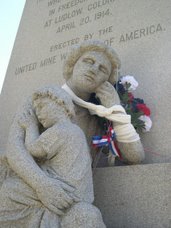A letter was read at each mass in each parish of the Roman Catholic Church in Colorado this weekend.
The letter endorsed passage of the amendment to the state constitution defining marriage as “one man, one woman” to prevent same sex marriages. It also appealed for the “no” vote on the referendum to provide full benefits for same sex partners in areas of health care, life insurance and advanced directives for medical decisions.
The rationale for this endorsement and appeal was to protect the sanctity of marriage and the family as defined by the Church. It stated the family and marriage were in grave danger without passage of the amendment and refusal of the referendum.
The letter was signed by Archbishops Chaput, Sheridan and Tafoya of the three Colorado Catholic archdioceses.
These three have yet to send such a letter to address the now obviously illegal and immoral war.
In early October I was sent the following talk given by Tom Roberts, Editor of the National Catholic Reporter. I hope you’ll take time out to read the talk. It puts the issue of religious involvement in politics into a fair and rational perspective.
Peace,
Terry Leichner
God Doesn’t Register to Vote
a talk by
Tom Roberts,
Editor, National Catholic Reporter
to
Kansans For Faithful Citizenship
Sept. 23, 2006
If you’ve encountered the same kind of wisdom I did while growing up, then you’ve heard that if you want to remain a respected member of polite society you don’t bring up religion or politics. I leave you to draw your own conclusions about someone who would accept an invitation to speak of both at the same time.
That said, one need look no further than a well-known saint to ground this in some respectability, so I’d like to begin today with a short reflection on St. Thomas More, who exemplifies the champion of principle, someone who went to his death rather than betray his conscience. It is said that on the guillotine just before he was beheaded, he remarked: “I am the king’s good servant, but God’s first.”
More is also referred to in a 2002 document of the Vatican’s Congregation for the Doctrine of the Faith in a note “on some questions regarding the participation of Catholics in political life,” and I figure it is a singular indication of grace whenever the Vatican and I are in agreement. In that document, More is cited as the Patron of Statesmen and Politicians who, through his martyrdom, gave witness to “the inalienable dignity of the human conscience.” It notes that More refused to compromise, and that he “taught by his life and his death that ‘man cannot be separated from God, nor politics from morality.’”
I agree with all of that and for many of the same reasons I find More a favorite historical figure and saint. It is essential to note, however, that while More was, in the end, resolute about his fate, he did not go to it willingly or without examining every angle for a way out.
The playwright Robert Bolt, in one scene of “A Man for All Seasons,” has More explaining to his daughter and son-in- law: “God made the angels to show him splendor – as he made animals for innocence and plants for their simplicity. But Man he made to serve him wittily, in the tangle of his mind! If he suffers us to fall to such a case that there is no escaping, then we may stand to our tackle as best we can, and yes ... then we may clamor like champions ... if we have the spittle for it. And no doubt it delights God to see splendor where He only looked for complexity. But it’s God’s part, not our own, to bring ourselves to that extremity! Our natural business lies in escaping.”
In another scene in that wonderful play, Bolt has More speaking again to son-in-law Roper who, in one of his frequent overheated moments is clamoring like the champion, declaring that he would cut down all the laws in England to get at the Devil. “And when the last law was down,” More asks, “and the Devil turned round on you – where would you hide ... the laws all being flat? ... Yes, I’d give the Devil benefit of law, for my own safety’s sake.”
Roper then accuses More of worshiping the law as his god, and More, weary with the discourse, says bluntly: “Oh, Roper, you’re a fool, God’s my god .... But I find him rather too subtle … I don’t know where he is nor what he wants.”
I seek your indulgence for this brief disquisition on Thomas More because I’d like to extrapolate from this complex and intriguing life three points that may be relevant to our own time. And they would be, of course, in addition to the obvious point, that individual conscience, well formed, is inviolable:
First, people will resist to great lengths allowing someone else to impose on them a belief or standard that they do not hold or that violates conscience. We don’t have a king today, but substitute religious leaders and politicians who use language that sounds more like religious dictates conveyed directly from God and not as political dialogue that seeks to persuade in the marketplace of ideas, and I think you have some sense of why there is such bitter division. When a bishop says those who are involved with stem cell research, for instance, are committing genocide or a conservative evangelical politician announces that Christians must take over the government for Christ, people of goodwill, religious and nonreligious, will tend to dig in their heels to protect their consciences, their civility and their own ideas about religion and its place in the halls of power.
Second, those who believe we have absolute right and certainty plus the will of God on our side, are capable of cutting down all the trees in order to get to the devil, or at least to bend the rest of the world to our way of thinking. A surprising number of people believe the United States enjoys God’s special favor in foreign affairs, even when the country is in the midst of two open-ended wars; even when its leaders advocate the use of torture, holding detainees without limit, without charges and with no access to legal representation or legal proceedings; even when secret trials and secret prisons are the order of the day and when detainees, without charge, are swept up and sent off on “extraordinary rendition” flights to third countries where, most often, they are tortured. Such a God would have to ignore a great deal in the texts we say he inspired in order to give assent.
And third, be suspicious of those who, like Roper, are certain of God’s will for all of us. I’ll opt instead for More’s understanding of a God who is more often than not difficult to discern in this human business and who only infrequently calls us to absolute clarity.
I think it is safe to say that we can be assured that God has no party affiliation, does not register to vote and would likely have much to say to partisans on all sides about where we all fall short.
In this regard, however, one must quickly add that God the merciful would probably also give credit to those who have joined the fray, who recognize complexity where some demand simplicity, and who are genuinely wrestling, sometimes wittily and sometimes in a rather dull way, with the difficult issues of the day.
Allow me one more point that I think is pertinent: And that is, for all of his grand virtue, More was an advocate of executing heretics for crimes against beliefs that today would be considered differences of belief and practice hardly worthy of a rebuke in church. We can only be grateful that one age’s ultimate truths and absolutes become malleable in another. And that might be something we keep in mind as we contemplate our certainties about such issues as homosexuality and homosexuals’ place in our society and our churches. I don’t think it is any concession to a culture of relativism or to any other dark forces that today we would think it unconscionable to behead people because they do not believe or live as we see fit.
In the final analysis, I think More’s life makes the case well that religion and politics (or religion and power) are at their best when they inform each other, partners in an exchange of ideas and of principle and expediency. When they mix, when they attempt to too closely share the same space, things can get dangerous.
We live today in an age of expanding religion and a diminishing god. Religion has spread, like a thin layer of dust, over our political and civil discourse. It covers much but often doesn’t get very deep. The condition is evident, certainly, on the extreme right, when God is summoned as a kind of party regular. I think it is, unfortunately, becoming increasingly evident on the left – with blogs on God’s politics and endless musing about the value of values voters and attempts to one-up each other in establishing our religious bone fides. Face it, when Rep. Nancy Pelosi begins quoting Pope Benedict XVI from the House floor, as she did recently in support of some measure, we’ve reached new heights of the politically and religiously absurd.
Religion in this new political context has developed code words and implied messages about who’s with God and who isn’t; about who has values and who doesn’t; about what political issues constitute true religion and which are merely marginal, a matter of “prudential” judgment.
Religion placed at the beck and call of partisan politics strains the credibility of religion to the breaking point. It has little to do with seeking the common good. In service of this thin religion, God has been dragged into the public discussion in a way that demeans all that is holy. From the fundamentalists and evangelicals in the United States who have long felt shunned and who have made their bargain with power politics; to the Catholic bishops willing to make grand compromises on the toughest parts of their social agenda to make their bargain with power on a few narrow issues; to radical Islamists who use old animosities and understandable frustrations to fuel an irrational and violent politics, God is said to be everywhere and on the side of everyone.
According to a recent poll of American religious beliefs conducted for Baylor University , one out of five Americans believes in a God who favors the United States in worldly affairs. I find that a frightening statistic, both for what it means for foreign policy and what it means for religion. Paul Froese, who teaches sociology of religion at Baylor and helped devise the survey, told Religion News Service the results show that “The idea of God, the belief in God, can be in a political sense exploited for nationalist purposes.”
I believe we need to unchain God from our smallness, from our restricted imaginations, and stand in awe of the unknowable. We must stop enlisting God in our causes, as sponsor of our ambitions and greed. We must stop insisting that we know precisely what God believes about issues, about political strategies and whose side he cheers in the spasms of human violence we call war.
Does that mean, though, that God is remote and removed; that God has nothing to do with our lives? Does it mean that our religions, however inadequate, have nothing to do with how we approach public policy issues and the giant ethical questions that seem to proliferate with each new advance in science and technology?
Of course not. What we believe; what affects most deeply who we are and the convictions we hold are the most important elements we can bring to any public process. Those are the things that make a community rich and vital.
I would not be doing what I do—decades in journalism focused on issues of social justice, reporting on the marginalized, those most deeply affected by poverty, by war and by the deepening divisions between what John Paul II called the rich North and the poor South—had it not been for a host of teachers from the religious community along the line of my life.
I would have fewer questions – and likely different kinds of questions—about foreign policy, militarism, military spending, exploitation of the earth’s resources and humans’ responsibility toward creation, including the extremes of life, were it not for the teaching and the lives of such figures as Daniel and Philip Berrigan, Dorothy Day, Thomas Merton, Archbishop Oscar Romero, Mother Teresa, Sr. Joan Chittister and the good and patient Oblates at DeSales University in Pennsylvania.
Could our consciences have been formed as they are to detest the deep sin of racism had it not been for the powerful witness of Dr. Martin Luther King? It was more than a passing detail in his biography that he was a well educated Baptist minister whose convictions found their most eloquent expression through the cadence of Christian scriptures. Nor is it insignificant that his message was incubated in the Black religious community and his philosophy of nonviolence was inspired not just by the teachings of Jesus but also by the life and writings of another deeply religious giant of 20th century thought and politics, Mahatma Ghandi.
For most of us, our corporate and individual histories are intimately and irreversibly linked with faith and religious traditions.
The real concern for me is not that people of faith and their leaders should be involved in politics. I think religion has a great deal to say to the political world. But when a candidate for attorney general sends out a memo entitled “Church efforts” outlining how best to exploit churches and pastors, and people of faith during an election cycle, churches should be very cautious. In this case religion is no longer informing politics, it is either being used by it unwittingly or complicit in a dangerous dance.
No, for me the great fear is that over time religion, including my own Catholicism, will be so co-opted and manipulated in the political arena that it will become unrecognizable as a faith community. My fear is that if we continue to deal as lobbyists – tacitly throwing support behind a party or a politician for his or her promises on a favorite issue and willing to ignore the others – we’ll be unable to speak to power with the force of the prophet.
It’s already happened on the red button issue of abortion.
An aside here for anyone taking notes with the intent of running off to find the nearest bishop. I am not here taking issue with church teaching. I think that if the church in its public pronouncements were not upholding the value of life all along its spectrum the world would be a much poorer place. What I am taking issue with is political tactics and strategy.
Some years ago during one of the U.S. bishops’ annual meetings, I spoke with a highly placed prelate who was one of the leading anti-abortion activists in the hierarchy. It was a private conversation and he volunteered that during the 12 years of the Reagan and first Bush administrations the church had been, in his words, “badly used.” What he meant was that for all the work the bishops had done to deliver the Catholic vote to politicians promising to do all manner of things to fight abortion, little had happened.
The next day I encountered a lay person who was a national figure in the bishops pro-life campaign and I repeated the bishop’s assessment. The lay leader agreed, and then added that not only had Catholics been badly treated but in many cases were now stuck with legislators who, in addition to doing little to advance the pro-life cause, had actually worked against many of the other issues on the bishops’ social justice agenda.
Of course, neither would say anything on the record; nor would they tell their Catholic constituents that they had been badly used. But it was hardly a secret. Anyone who paid attention knew they were being used. And I can understand the real-life politics of that. You don’t lightly cross those who’ve got the power and the votes. But that is the corrupting element. Who knows, over those 12 years, how many other issues were soft-pedaled for the sake of promises on the abortion issue?
In a very real sense, it is a modern version of cutting down all the trees to get at the devil; all the old restraints that kept religious practitioners and political practitioners at healthy distances get trampled. And then you end up with something like the Rev. Rod Parsley, the Ohio pastor and ally of gubernatorial candidate Ken Blackwell, announcing that he wants to lend his mega church’s resources to fellow pastors and “work together in unity to win this state for Jesus Christ.”
And one must wonder what goes through the minds of the faithful going to synagogue for Rosh Hashanah or to mosque for Friday prayers. We have to be careful, I think, because it can happen that blatantly. Or it can happen more obliquely, but just as apparently, when a bishop announces the conditions for which Catholics can vote for candidates or precisely how candidates must approach an issue or face censure at the altar rail.
Religion and politics are very different arenas. In one the practitioners bring moral clarity and theological certainty; in the other the practitioners may bring to the table a desire to do the right thing, but they also bring with them the need to keep and accumulate power. It was James Madison who said “The truth is all men having power ought to be mistrusted.”
That is why I think the Interfaith Alliance offers good advice when it says: “Our nation can benefit from a recovery of a real, vital and viable partnership between religion, politics and government in which each treats the other realms with appreciation and respect without seeking to confuse them or join forces with them.”
In order to keep power in the political arena, political practitioners must be willing to compromise, and sometimes severely, if the situation requires. That happened in 2004 when Sen. Rick Santorum of Pennsylvania, one of the most outspoken anti-abortion activists in Congress, campaigned for his fellow Pennsylvania Senator, Arlen Specter, one of the most notorious pro-choice Republicans in the Senate, in his bid for reelection over Specter’s pro-life opponent. Why did our moral crusader, one who is incredibly quick to condemn those he deems are part of the culture of death, choose to back Specter?
Simple. Politics. Power in this case trumps principle. Santorum calculated that it was most important to keep a Republican majority.
I don’t know of any bishop who dared sanction Santorum for campaigning for a powerful pro-abortion colleague. Even the absolutists among us find there are limits to principle.
The point here is not to diminish the significance of church teaching or to point out someone’s inconsistencies. We all have them. The emphasis, instead, is on making sure that we understand the difference between church teaching and church politics.
One politician may determine that his approach is to fight to eliminate abortion – all or nothing – and he may be successful among his constituents with that approach, even if he delivers little in real terms. Another politician may decide that the best approach is not to seek elimination of or criminalization of abortion but to work hard for expansion of social structures and services that would immediately decrease the number of abortions. And numbers, we are told, to indicate such an approach works.
What is essential to understand is that both politicians can be working out of deep religious convictions without making their work an article of faith for everyone else. It is also essential to understand that neither is working from holy writ – God does not deliver political strategies or show up to endorse candidates on the stump. This is the part that requires all of us, politicians, and voters, activists of every stripe, to work in the tangle of our minds to find our way through the thickets of ethical, political, moral and practical problems that the modern world throws our way.
Some religious leaders might try to make it easy by moving out of our way all of the other complexities – war, poverty, sexism, militarism, environmental degradation and so on – by presenting us with a list of priorities, a kind of moral calculus for the easily confused lay electorate, and by telling us that there is only one approach ordained by God to tackling this thicket of issues. But it’s a false path to cheap grace.
There is no single, easy, one-size-fits-all solution to today’s political problems. There is no single way to be a good Catholic, or Presbyterian or Baptist or Jewish or Muslim voter. Each of us must inform our consciences, weigh the particulars in each instance, consult the consistent ethic of life– all the challenges we face – and then make our decision.
The fact that there are differences in approach was most evident during the last presidential election when some bishops were threatening to ban from communion – the central act of faith in the Catholic community – politicians who did not vote as the bishops deemed correct on the matter of abortion. Some even extended the threat to those who would vote for those candidates.
Cardinals McCarrick of Washington and Francis George of Chicago and numerous other bishops individually let it be known that they would not use the Eucharist to make a political point.
And the bishops jointly ultimately released a statement essentially saying the same thing.
During that period, our Vatican correspondent, John Allen, reported that Pope John Paul II had twice distributed communion to high profile pro-abortion politicians.
In 2001, during a large outdoor mass celebrating the end of the Jubilee Year in Rome , John Paul personally distributed communion to Francesco Rutelli, a well-known Catholic, the Mayor of Rome and one of the leaders in liberalizing Italian abortion laws. Two years later, in a private ceremony in the pope’s apartment, John Paul gave communion to British Prime Minister Tony Blair, who had long supported abortion rights and was an Anglican as well.
Allen further reported several times that the abortion issue held to a much lower profile among the hierarchy in Europe than it did in America. I mention these examples because as the campaign season heats up, I think Catholics will have to keep in mind that among the bishops in the United States and around the world there is no monolithic approach to any of the burning political issues. Further, while church teaching is a major factor in the formation of conscience, and both the Vatican and the U.S. bishops have issued statements serving as guidelines on responsible citizenship, no one has issued infallible rules for engaging in electoral politics. Nor would they.
One measure of the ability of our religious leaders and moralists to adapt flexible approaches to life issues is to understand that across this land bishops and priests find a way to accommodate in our sanctuaries and at the altar rail those who design, manufacture and are prepared to use weapons that have been repeatedly condemned by popes; weapons that by their very existence threaten all of life as we know it. In addition, an endless array of moral loopholes is available to those who want to justify war in all of its manifestations which, unlike with other issues, we are forced to support with our taxes and encouraged to make possible with the lives of our sons and daughters. We even supply the chaplains.
I don’t want to appear unnecessarily contentious or make this exercise unnecessarily burdensome. The upside, as I see it, is that our concern about religion and politics and how they can be made to work for the common good has nudged us and many others across the country – and on the many sides of political divides – to meet in hotels and church halls and community centers to discuss our futures and how we will shape them.
There is so much to do. While we live amid incredible abundance and benefit from the latest in technology and science, many among us live on the edge:
In 2005, 37 million people or 12.6 percent of the population were in poverty. That figure includes 7.7 million families and 12.9 million children under the age of 18. That’s a lot of hungry kids living often in terrible circumstances.
46 million people have no health insurance coverage and they and many more receive inadequate health care.
The distance between those who have and those in need is growing greater, we are constantly told; here in the richest country the world’s ever known.
Globally, the population of refugees from horrible violence keeps growing, as do the victims of tribal and ethnic wars;
While the U.S. stands 36th in the world in the category of infant mortality, with 6.63 deaths per 1,000 live births, we rank first by hundreds of billions in military spending. It now lies somewhere between $420 billion and $507 billion, not counting the wars in Afghanistan and Iraq or the money from the Energy Department for the development of nuclear weapons. U.S. military spending comprises 47 percent of the world’s total.
We need to ask if we’re setting the correct priorities.
The world groans for our attention, for our compassion, for all the skills one can find in this room and much more. It is in deep need of all the forces that have brought us to this point – all the spiritual and intellectual formation we have undergone.
We people of faith ought to make all politicians, left, right and center, nervous with our convictions. We shouldn’t sell our franchise on the cheap or make ourselves predictable.
Politicians ought to fear losing our votes because of what they do or don’t do to foster life at its earliest stages no more than they fear losing our votes because they ignore the poor at home and abroad or because they engage in pre-emptive wars or ignore threats to the environment or walk away from international treaties.
To bring justice across the spectrum of issues demanding our attention requires a robust faith, not one that seeks to shrink the horizon and make things easy.
Most of all, the world needs our deep commitment to justice; however one sees that being exercised in the real world. Cardinal McCarrick, writing recently in the Jesuit publication, America, on Restoring Civility to Political Discourse, quotes Benedict XVI’s assertion that “the just ordering of society and the state is a central responsibility of politics.” The pope continued: “Politics is more than a mere mechanism for defining the rules of public life: its origin and its goal are found in justice, which by its very nature has to do with ethics.”
There is still room for nobility in this matter of public service. And time for work. We have not yet been called to the point of no escaping.
# # #
Tom Roberts
